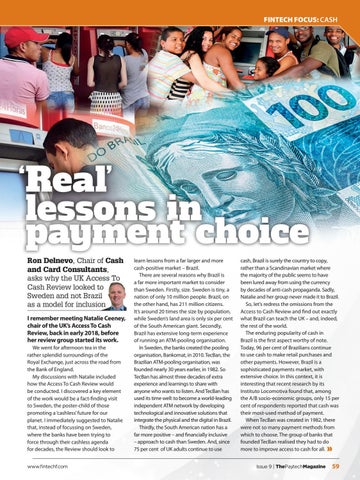FINTECH FOCUS: CASH
‘Real’ lessons in payment choice Ron Delnevo, Chair of Cash and Card Consultants, asks why the UK Access To Cash Review looked to Sweden and not Brazil as a model for inclusion I remember meeting Natalie Ceeney, chair of the UK’s Access To Cash Review, back in early 2018, before her review group started its work. We went for afternoon tea in the rather splendid surroundings of the Royal Exchange, just across the road from the Bank of England. My discussions with Natalie included how the Access To Cash Review would be conducted. I discovered a key element of the work would be a fact-finding visit to Sweden, the poster-child of those promoting a ‘cashless’ future for our planet. I immediately suggested to Natalie that, instead of focussing on Sweden, where the banks have been trying to force through their cashless agenda for decades, the Review should look to www.fintechf.com
learn lessons from a far larger and more cash-positive market – Brazil. There are several reasons why Brazil is a far more important market to consider than Sweden. Firstly, size. Sweden is tiny, a nation of only 10 million people. Brazil, on the other hand, has 211 million citizens. It’s around 20 times the size by population, while Sweden’s land area is only six per cent of the South American giant. Secondly, Brazil has extensive long-term experience of running an ATM-pooling organisation. In Sweden, the banks created the pooling organisation, Bankomat, in 2010. TecBan, the Brazilian ATM-pooling organisation, was founded nearly 30 years earlier, in 1982. So TecBan has almost three decades of extra experience and learnings to share with anyone who wants to listen. And TecBan has used its time well: to become a world-leading independent ATM network by developing technological and innovative solutions that integrate the physical and the digital in Brazil. Thirdly, the South American nation has a far more positive – and financially inclusive – approach to cash than Sweden. And, since 75 per cent of UK adults continue to use
cash, Brazil is surely the country to copy, rather than a Scandinavian market where the majority of the public seems to have been lured away from using the currency by decades of anti-cash propaganda. Sadly, Natalie and her group never made it to Brazil. So, let’s redress the omissions from the Access to Cash Review and find out exactly what Brazil can teach the UK – and, indeed, the rest of the world. The enduring popularity of cash in Brazil is the first aspect worthy of note. Today, 96 per cent of Brazilians continue to use cash to make retail purchases and other payments. However, Brazil is a sophisticated payments market, with extensive choice. In this context, it is interesting that recent research by its Instituto Locomotiva found that, among the A/B socio-economic groups, only 15 per cent of respondents reported that cash was their most-used method of payment. When TecBan was created in 1982, there were not so many payment methods from which to choose. The group of banks that founded TecBan realised they had to do more to improve access to cash for all. Issue 9 | ThePaytechMagazine
59
